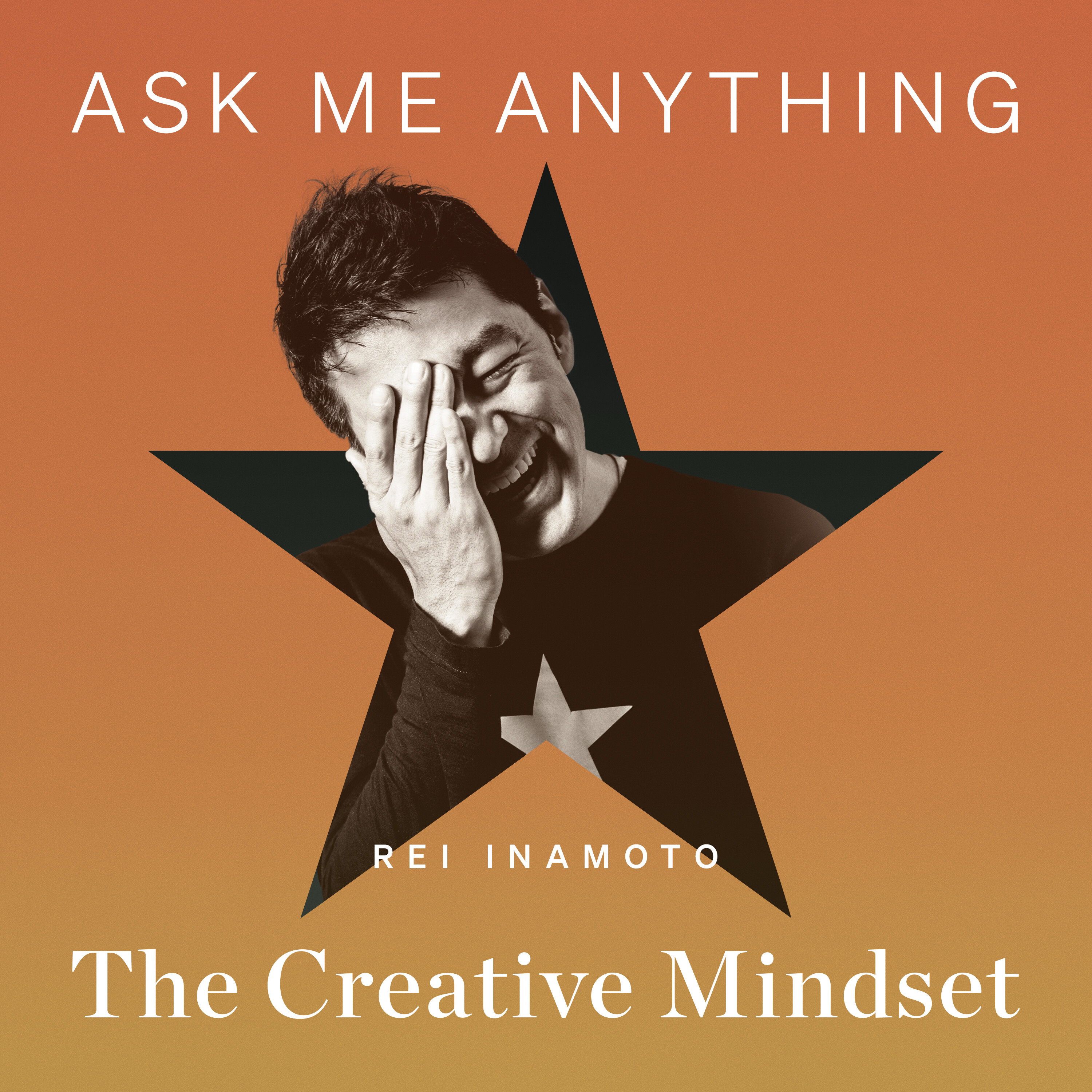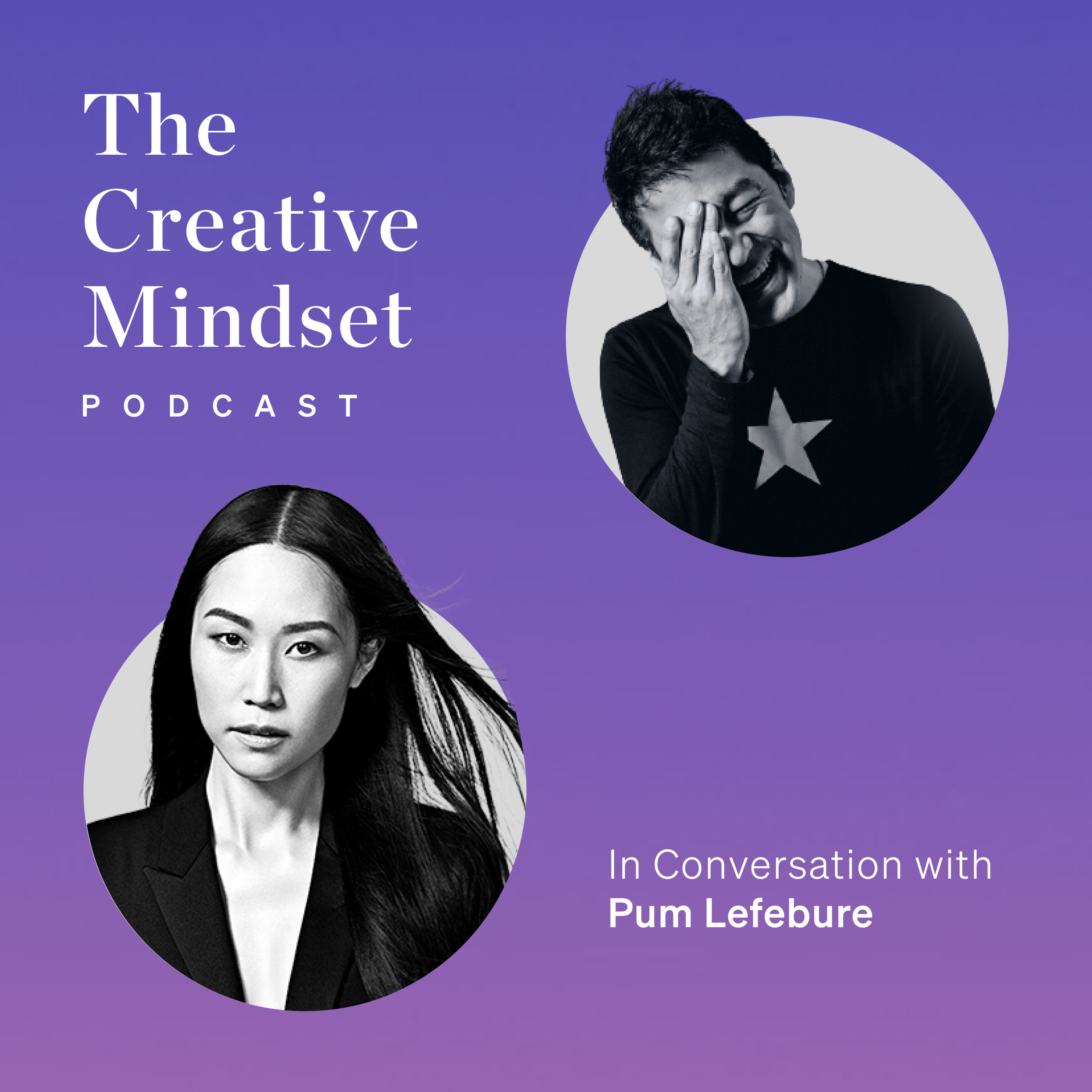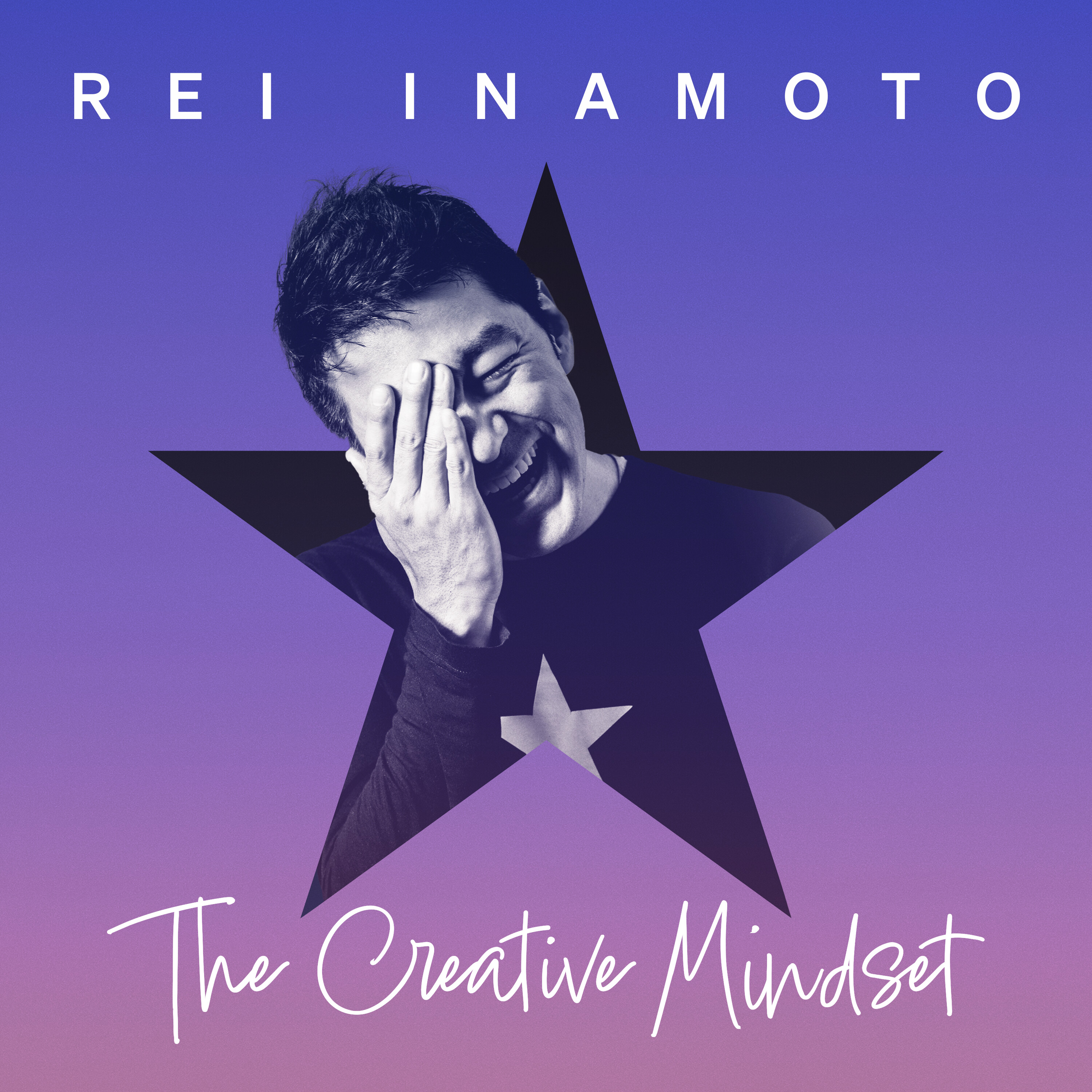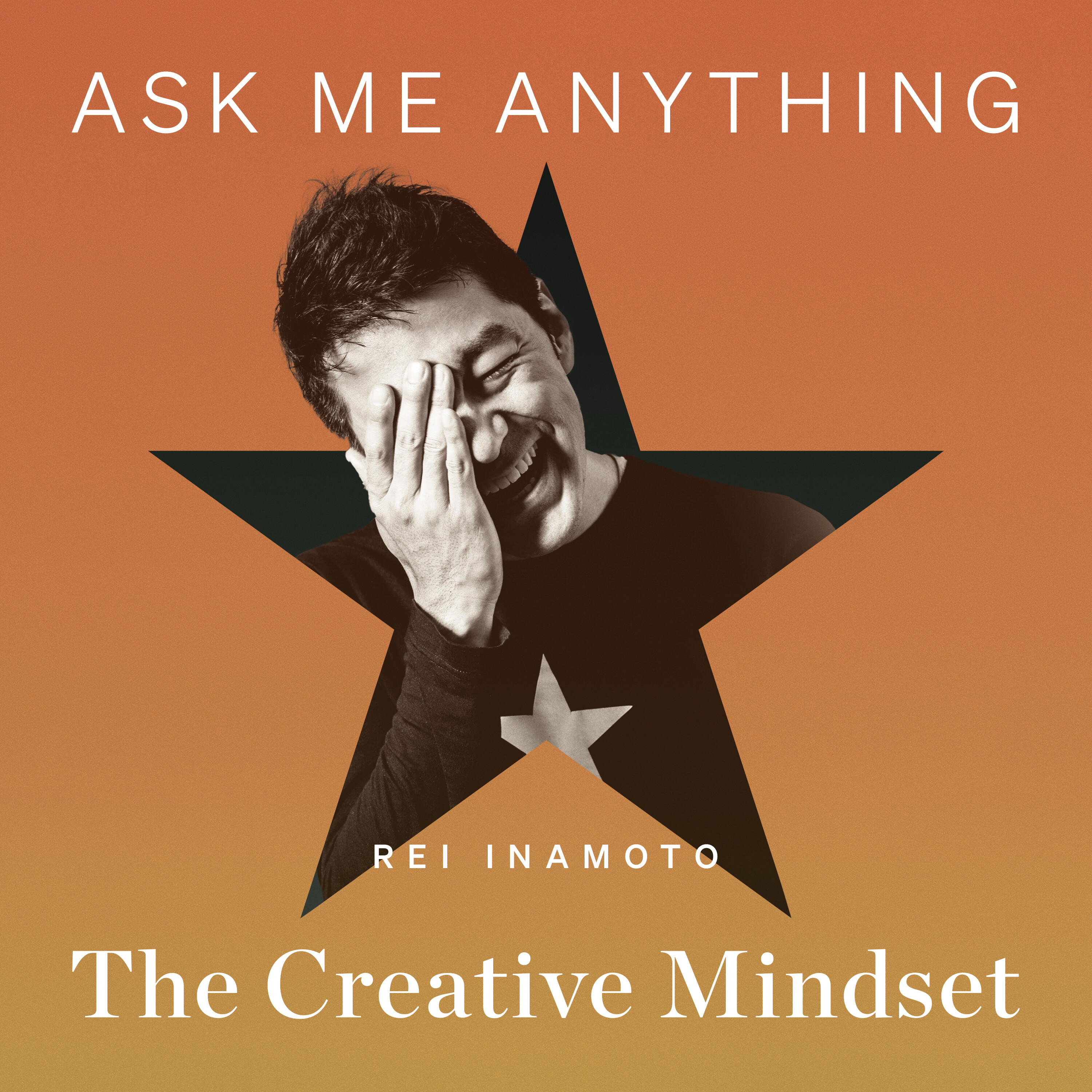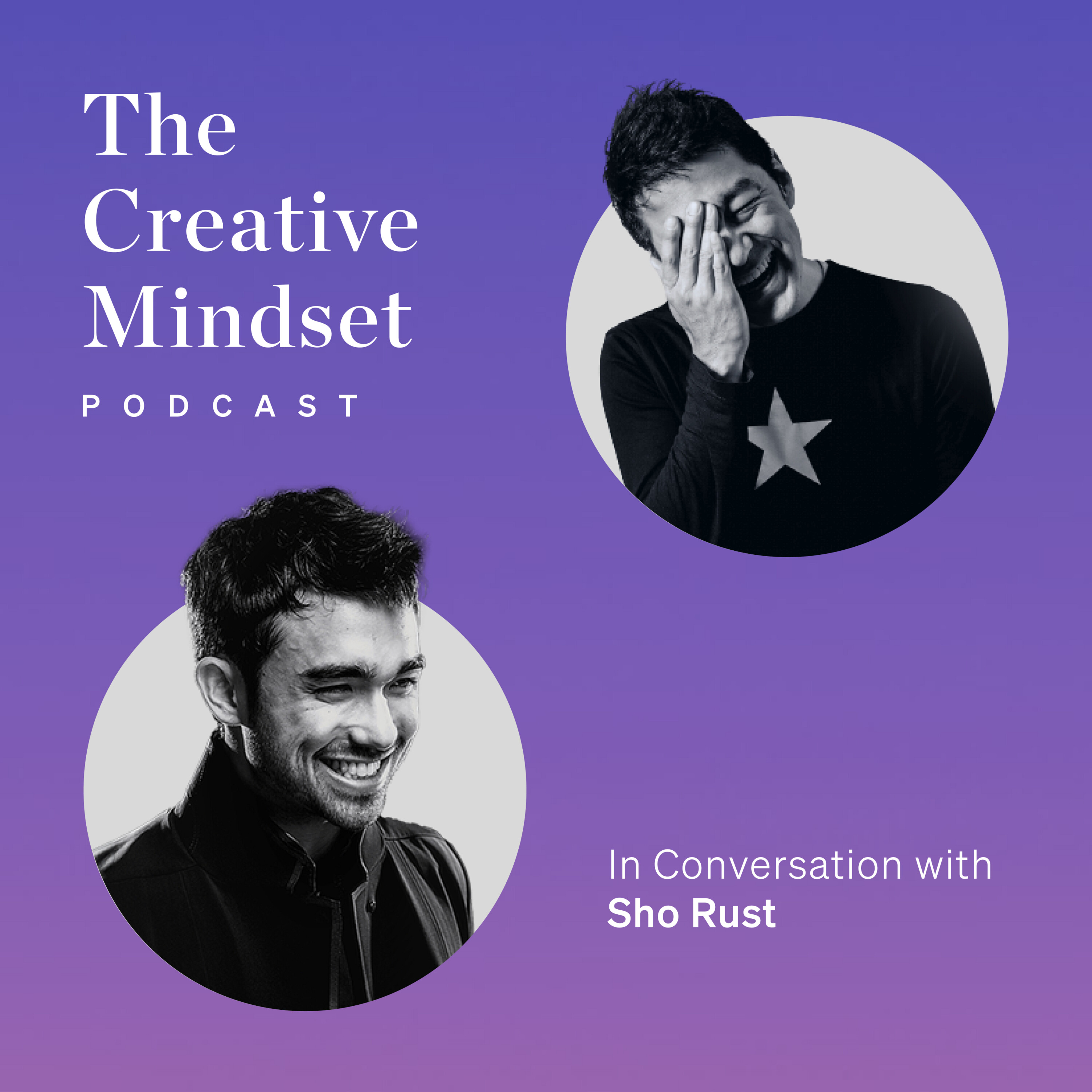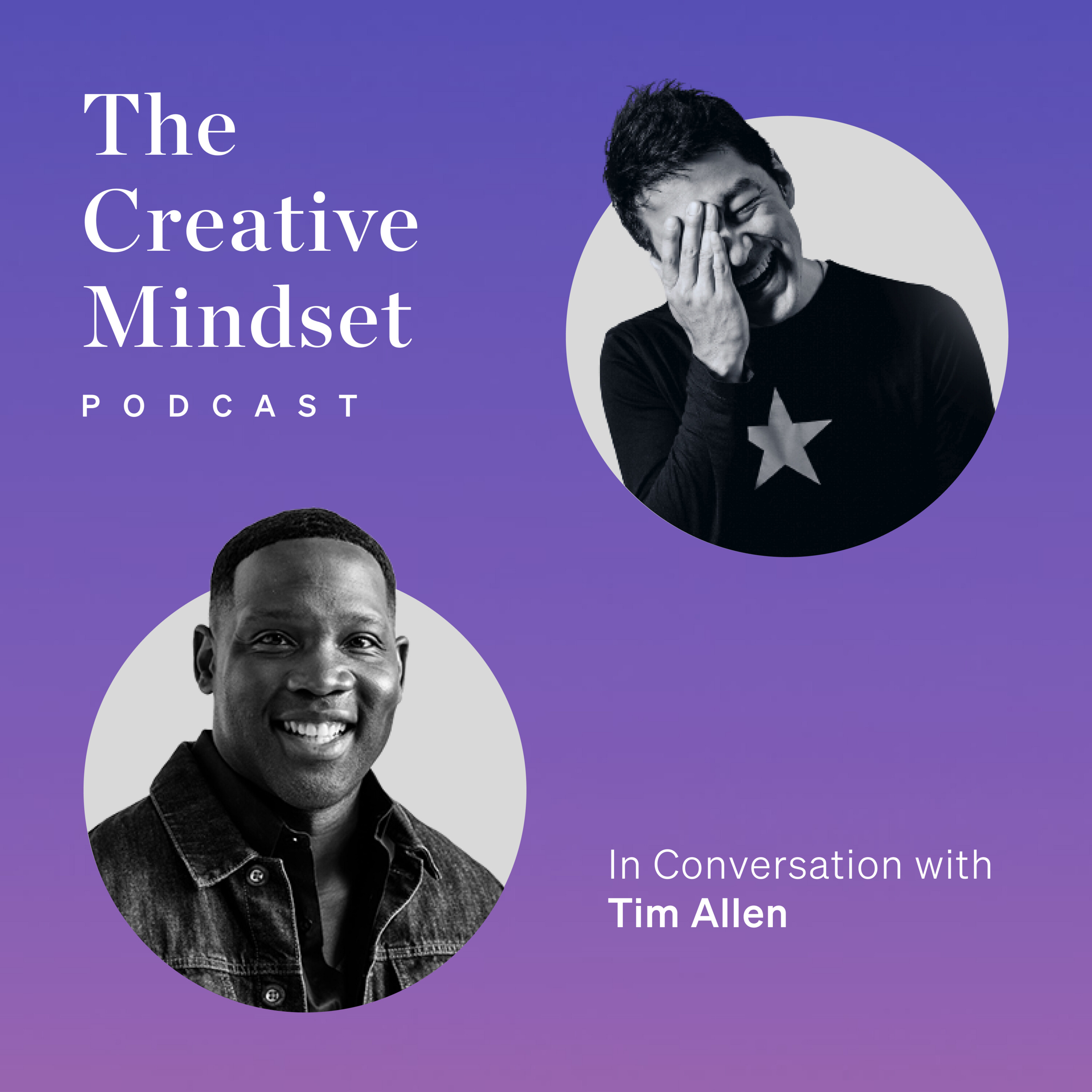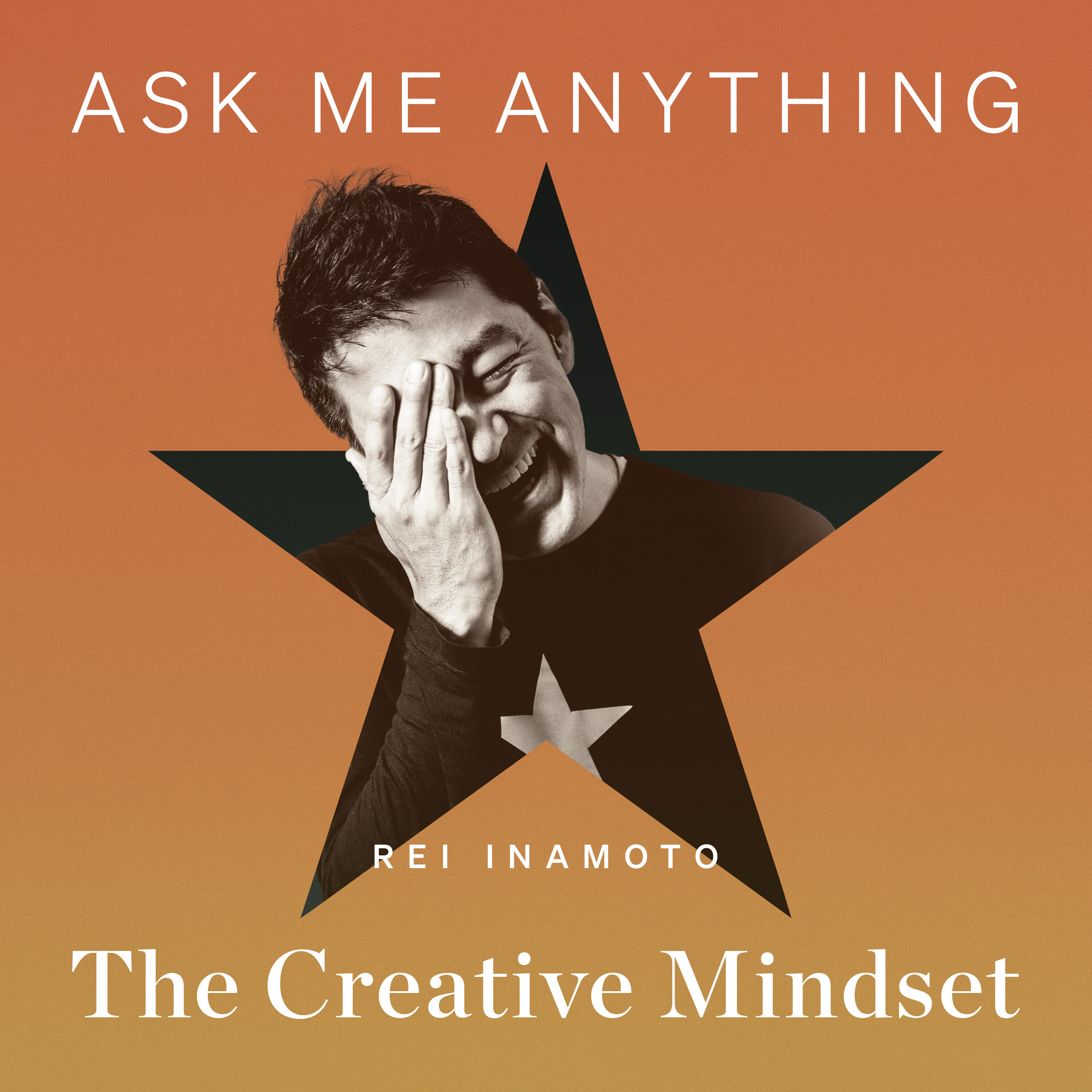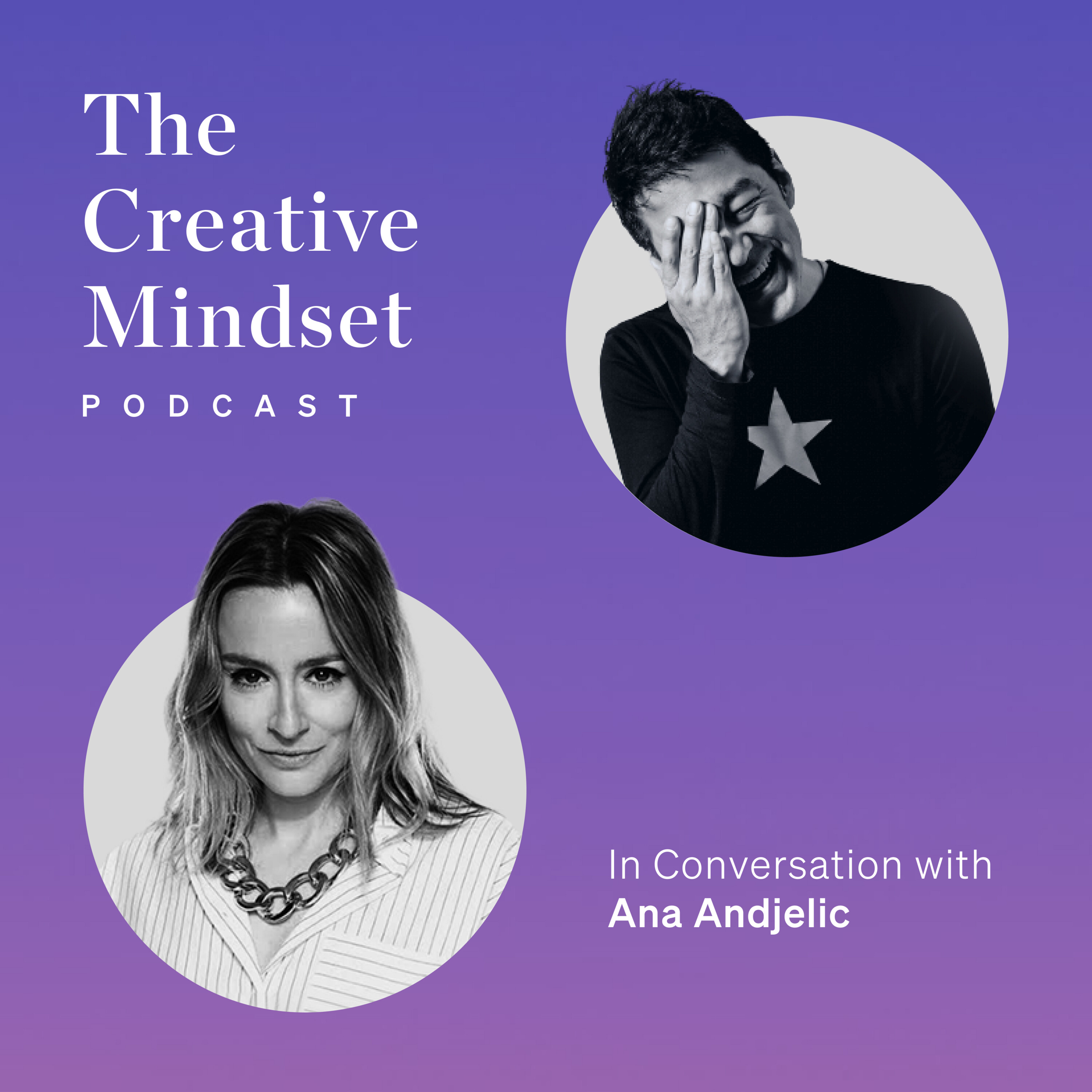This is ReinaMoto's podcast, The Creative Mindset.
Hi everyone, welcome to The Creative Mindset,
a podcast about what the future holds at the intersection of creativity and technology.
I am ReinaMoto, the founding partner of I&CO, a global innovation firm based in New York and Tokyo.
Today's episode is AMA, Ask Me Anything, where we answer questions from our listeners.
Instead of just answering them by myself,
we invite them to be on our show and make that into an open conversation.
Today's question came from Leah Safina, who is a digital product designer based in Hawaii.
Originally from Belarus, she immigrated to the US when she was younger
and started her career as a designer in New York City.
Before the pandemic, she traveled around the world
and ended up settling down in Hawaii during the pandemic.
I read a newsletter and in one of the articles, I mentioned about personal branding.
That was the article that she responded to
and she wanted to ask me about branding in general
and how she can break through the ceiling that she feels that she has
as a female immigrant in the United States.
So let's get started.
Ask me anything.
Leah, it's been a long time.
Good to see you.
Good to see you too, Ray.
So just to give our listeners a little bit of context,
Leah and I used to work together on my company before COVID.
So it must have been four, three, four years ago.
You were a freelancer with us for several months or so
before you went on your world tour trip and then COVID hit.
So tell us and tell the audience where you are.
So I'm currently located in Hawaii and I've been living here for two and a half years now,
which is very unexpected.
I never meant to stay here.
I was visiting, but then I just created this amazing community here.
I met my partner here who is also in innovation
and, you know, I blinked and it's been two and a half years that I'm here.
Well, it's not a bad place to be stuck for two and a half years.
I mean, you know, just we were chitchatting before starting the recording
that devastation from the fire.
You were on a different island, so you weren't affected by it.
But, you know, hope that the state of Hawaii
just in general recovers from that as quickly as possible.
Yes, it's truly a heartbreaking event and truly a big tragedy,
especially for, you know, the native Hawaiians, the culture of Hawaii.
And what I can say, though, is that I'm observing the communities really coming together,
all the different islands sending the help, the donations,
all the materials that people need coming together to support the organizations.
And truly, Hawaii is very, very resilient.
And I really hope that, you know, people will find a way through
and the highway is going to be rebuilt the same way that it was
and not turned into a new touristic destination with luxury hotels.
Right, definitely.
Well, best of luck.
And, you know, anybody who can support, please, please, please do.
So to get into the conversation,
if you can just give a quick background about you and what you've done.
And then, you know, you sent us your question via email,
but I wanted to have you talk to us about the question that you wanted to discuss.
Perfect.
So I work in digital innovation.
Originally, I was a UX UI designer for different websites and apps and services.
But over the years, I found my niche and specialization
in working in new and emerging technologies.
To simplify it, I constantly solve the new use cases
in the areas where there are no best practices.
So you cannot copy something that's already out there.
You have to figure out from scratch whether it's AR, VR, blockchain, AI.
But it doesn't necessarily have to be that.
It could be as simple as new approach to e-commerce,
new approach to dating apps, new approach to media.
So anything that can really streamline the processes for people,
simplify their lives is something that I love doing.
And I was very fortunate to work with over, I think,
70 different companies over the years.
So it's been a great ride.
70 different companies?
Yeah, seven zero.
Wow.
I have a spreadsheet with every single project I ever worked on
coded by the type of medium, type of industry,
different agencies that I work with.
So I try to keep track.
You must be a UX designer.
Yep, yep.
That's exactly the origin that I come from.
So the question that I sent you,
and I noticed that you were providing so much helpful advice
to people in different senior leadership roles in creative industry.
And I couldn't help but jump on the train
and try to get some wisdom from you as well
on the subject of personal branding,
but more specifically, how you show up in the public spaces.
And by public spaces, I mean different media publications,
conferences, podcast features,
any place when people can learn that you exist,
that these are the services you provide,
and just listen to your case studies and stories.
And what I found out, so myself being an immigrant,
which I think is quite important for this question,
because I did not go to a fancy school in America.
I do not have these connections across all the different people
who started their own businesses
and went on to take the roles of leadership, right?
I had to build everything from scratch.
And what I'm noticing is that
whatever you are reaching out to journalists, podcasts, etc,
it seems to be a barrier.
There seems to be some kind of glass ceiling
where if you don't have a powerful company name,
such as Amazon or Nike or Spotify,
directly in your role description, you tend to be ignored.
So it's not really a meritocracy.
It's all about who do you know, right?
And whether you're able to pay a couple of thousand dollars
for a subscription service that's going to provide PR for you.
There is another layer that I would like to provide
is that with my career specifically,
I deliberately build my path to be very versatile as a designer.
So I did not go in-house for many, many years.
For almost seven years, I've been freelancing
with different projects and different agencies.
And when I talk to people from bigger companies
like Google and Spotify,
I can say that our level of skill and leadership is on par.
But I don't have that big company name behind me.
And it was deliberate.
I want to work as a consultant, as a freelancer.
And so a lot of my submissions get overlooked
because of that.
So this is a very much open-ended question.
We can go anywhere from here.
But essentially, it's about getting people to know
that you exist and building your brand in the public arena.
So going back to my first point
about how the game has changed,
and I don't need to explain to you,
I don't need to explain to our listeners
how certain things that weren't possible 10 years ago
is now possible,
especially when it comes to personal branding, right?
So for instance, sort of an extreme example of that
would be somebody like Mr. Beast,
who is 25, 26 years old,
he's from like North Carolina or something,
and six, seven, eight years ago,
he just started uploading YouTube videos
of him playing games and commenting on them.
And then now, he's got a brand,
and now he's one of, if not the biggest star on YouTube,
and then the number of followers he's got
is like more than several network TV stations combined.
That kind of phenomenon wasn't possible 10 years ago, right?
So that's what I mean by the game has changed
and what wasn't possible 10 years ago is now possible.
Because of technology,
I would say the competition is going to get even more fierce
in the next 10 years than the previous 10 years, right?
And then the last point that I was making
was the traditional platforms and media places
that used to be the place to get noticed
may not be as relevant and as important as you think.
And what I mean by that is that I think
in general, especially when it comes to branding
and personal branding,
although the competition is much more fierce now
than it was 10 years ago,
and it's going to be much more competitive in the coming years,
it also, I think, is going to create more niches
where individuals like yourself, like myself,
and like hundreds and thousands,
if not tens of thousands of designers can thrive.
And if you have, say, 10,000 followers,
that might actually be enough
to really make a pretty decent good living.
You don't have to have 10 million followers
or even a million followers.
There are plenty of mini...
I mean, if you have less than a million followers these days,
I mean, there are so many influencers
with millions of followers.
But say, if you have 100,000 followers
or even like 10,000 followers,
that might be just more than enough
for you to make a perfectly comfortable living.
So for instance, I'll just give you a very personal example.
So my wife, who used to work in a corporate environment
for 15 years in Japan,
and just a couple of years ago, she quit.
And in the past two or three years or so,
she decided to become a personal professional career coach.
And she's got less than 5,000 followers on her Instagram,
but she's actually making more money now
than she was when she had a full-time job.
So the number of followers
or your personal brand might not depend
on the big media places that might not call you back
or that might not feature you.
And I don't know how...
Yeah, of course, you'll be good to be featured
in Fast Company or Wired or How Magazine or what have you.
But just because you get featured in those places,
may not mean that your personal brand is not where it should be.
I immediately wanted to ask a follow-up.
When are we seeing you on TikTok, Ray?
Yeah, I did open an account.
And so one thing that...
I'm older than you,
and I'm older than probably a lot of our listeners.
I'm in my 40s.
And I think with the advent of social media
and the ever-increasing complexity in the landscape of social media
and multiple options that you have...
When I started my career, there was no social media.
There was no mobile.
You can make a website, you have xyz.com,
and that was your playground.
And then blogs started to become big,
and then YouTube came, and then Facebook came,
and so forth and so forth, right?
And now there are so many different types
and so many different ways of expressing yourself
that it's easy to feel like you have to be good
at multiple media outlets.
But one thing that I've learned...
And I feel like I'm still learning,
is that I think one needs to find a medium
that they are good at.
And I've experimented with Instagram.
And yeah, I post on Instagram,
and I don't really post on TikTok.
But I'm not sure just yet
that if that's my go-to media for the time being.
My medium for the time being...
10 years ago, it used to be conferences.
I used to go speak at conferences.
And then in the past three or four years,
so just because of COVID,
that kind of stopped all of a sudden.
And I do get invited,
and I do get asked to speak at conferences.
But one thing that I did in the past,
say like 15 years ago,
very occasionally,
and I got a decent traction.
And then now I'm doing a lot more of is writing.
And as you know,
I started a newsletter not too long ago.
But I think for the time being,
writing is my medium,
because that's where I get to
organize complicated thoughts
and simplify them down
into a few tangible insights.
And could I make TikTok videos?
And I think there's a lot of pressure,
to your point,
for millennials, people in their 30s,
to show up on TikTok.
But I feel like there's this fear
of showing up on camera.
And I think the previous generation
had this fear showing up on Instagram
with their personal photos, you know?
Yeah, yeah.
But interestingly enough,
I've been consulting with a VC specialist in innovation
or a LinkedIn specialist
that I found through their TikTok.
So, you know, if you really power through
and you feel like you can show up raw
and unedited exactly like you're saying,
then the results are very much exponential.
The question is whether it's your medium or not.
And I think people can only get it
through experimentation.
And truly, I'm pushing myself.
I think it's my big goal for the next year
to try and see whether that's something
that I can be good at or, you know,
let it go and continue
some other different medium.
Yeah.
So just because everybody else is doing it
doesn't mean that you should.
And one of the things about social media
or just personal branding in general
is just lower your bar, you know,
lower the bar of your own standard.
Because I think you yourself could be,
or we ourselves, especially as designers,
could be our own biggest critic
and our biggest enemy.
Absolutely, absolutely.
Yeah.
I think consistency and regularity is key
when it comes to social media
and personal branding.
Social media is great
for a very particular audience.
My hypothesis is if as a service provider,
as a thought leader,
you're trying to connect with individuals,
social media is perfect
because this is how a lot of people get coaching,
et cetera, et cetera.
But if you're targeting companies,
and personally for me,
working in innovation is a really interesting career path
because a lot of these jobs,
they don't get posted out there.
Right.
So in order to get something
that's very much out there,
you have to be known as a person
who can handle this, who has experience.
And I feel like when your audience is companies,
still traditional outlets,
such as Forbes or Business Insider or Wired
are highly relevant even right now.
So with that in mind,
do you have any perspective
on whether it's worth trying to show up in that medium
or whether you feel like it's still very much gatekept
and you have to own your own company,
you have to run a hundred people offices
in order to be considered.
Here's something that really kickstarted
my pursuit of being a little bit more known in the industry.
And very recently I spoke at a conference
and I was a morning keynote speaker.
My peer from Amazon was a keynote speaker in the evening.
We were absolutely equal in terms of our placement
as keynote speakers in the program.
And me and her became really good friends.
After the conference, we were getting drinks
and we were talking and she's like,
well, how much did you get paid for the speaking gig?
And I said, nothing.
And she said, well, I got my flights paid for
and I got a couple of thousand dollars of speaking fee.
And what it equates to is because behind her name,
she had Amazon and behind my name,
I had just my consulting company.
Even though I worked in Nike, I worked on Toyota
and I worked on Google projects.
So that's something that I feel is a systemic issue
in the design world.
You get overlooked just because you didn't have these names
and it's not merit based.
It's name dropping based, if I may.
But I would love to hear your perspective on that.
This may not be what you wanna hear, right?
But I would say the world is not a fair place, right?
And whether it's the school that you went to,
whether it's the place that you worked for,
whether it's somebody that you know
or somebody that you're connected to,
those are, I think, factors of how things work partially, right?
So you have to, I think, build something
that you become known for.
And instead of relying on like Uber or Meta
or Google or Toyota or whatever,
those are other names that you rely on to build your brand.
Which, by the way, is a way of building a brand, right?
But just relying on that,
I don't think is going to get you beyond that.
Like I think you have to be known for what you do
and what you make if you're a designer.
Or what you write or what have you.
And that's something that, like I hear a lot from you,
oh, I don't have this name
or I don't have that name on my resume or behind me.
But I'm yet to hear from you,
okay, this is what I've done or this is what I've made.
And that became known.
Like you said that you work in the fringes of new technologies
and how to apply those new technologies
for the benefit of the user.
That sounds great.
But I'm yet to hear from you,
this is the thing that I've done to prove that point.
So here comes the second part of the thing
that I'm trying to overcome with more visibility,
which is NDAs.
So here's an example.
I worked on a project for Nike.
We were building an extremely innovative,
new part of post-purchase experience for their app.
They did not launch it yet and I cannot show it.
I worked on this new city for Toyota
where everything is self-driving and there are robots
and we're building dashboards
for people who manage these robots
and for citizens who live there.
None of this has been released
and I'm not able to show it to people, et cetera, et cetera.
There's so many, I would probably say half
of all the work that I've done
is extremely protected by NDAs.
So my pursuit, and I absolutely agree with you.
I think it is paramount to be known for the work
and that's something that I'm working towards.
That's the reason why I speak at conferences.
And mind you, I still talk about my work for Toyota
in the conferences, but I don't show it.
I talk about the methodology
of how I was able to solve certain problems.
But that's why my hypothesis was that showing up at Forbes,
showing up at Business Insider, showing up at Wired
and being able to provide a take on certain technologies,
being able to speak about the methodology,
being able to mention certain things
would create that support system, as you say.
Really showing the receipts that you're able to do it.
But unfortunately, half of my projects are heavily NDAed
and there's just no way around it.
So one of the things that I wrote
in the newsletter that you responded to
where I talked about how to build a brand as a designer
and I talked about four elements of,
not just a personal brand, but any brand.
And those four elements are relevance, differentiation,
presentation and consistency.
And what you just talked about,
the fact that you cannot really show the work,
supposedly these really innovative projects
that you worked on for Nike or Toyota
that you cannot show is point number three, presentation.
The fact that you are not able to present,
visually present the work is a disadvantage.
Right?
So as a designer, I think, I call myself a designer
and I'm a little, there are many different types of designers,
but at the end of the day, we make things,
we make visible things.
If we don't have a thing that we don't become known for,
then the question is, what does she, what do they,
what do they design?
They say they do innovation, but I don't see it.
They talk about it, but I don't see it.
So you might be rushing a bit too much.
You know, so yeah, it would be nice to get featured
in Forbes or Wired or those big name publications
or, you know, you'd be nice to be pursued than to pursue.
But say like, you know, if you spend the next two years
and two years is not that long.
I mean, we spent inside our homes for the past,
you know, for two years in the past three and a half years.
Right?
Yeah.
And like, if you have a really iconic piece of work
that you can claim that you really had
a significant involvement in,
and on the other side of it, you can claim,
as long as you can, don't take credit for you can't,
you know, you didn't really do.
Right?
Because people will find out.
Yeah.
But work on something for, say, 24 months
and really, you know, knee deep, heads down.
And then the work is something that you can credibly say
that I was part of, you know, something like,
I mean, that's a huge project.
So you're not the only one doing it.
Right?
So it's part of the team that you'll be working on.
But I think my advice would be to find a project
that you can spend, say, 24 months
and that you could be known for.
And without that, I think you might be rushing
to build your personal brand.
I think you're really getting at a very important theme
that I think will be relevant for so many people
listening to us is that it's very easy to be impatient
and it's very hard to be patient.
But that's something that my generation needs
to remind ourselves of.
The generation of people who worked in one career
for 20 years, for 30 years, 50 years.
And then we have the generation that starts a company
when they're 18 on TikTok
and suddenly gets 100,000 followers
and never have to enter the corporate world.
There's a sense of instant gratification
and there's a sense of impatience
and there's a sense of I'm seeing all of these examples
of people who are extremely young,
ambitious and capable achieving something.
And it can be very doubting on yourself and your career.
And that's why, for me, I was thinking a lot
about being patient and exactly what you're saying,
really taking my time with working on something
that could truly be a representation of my brand.
Or hopefully one of the projects that I worked on
in the previous year will finally be released.
On top of that, it's so easy to be distracted
because of social media.
It's so easy to feel that you're missing out on something
just because you don't have 10,000 followers
or 100,000 followers.
It's easy to feel that you're behind.
And that's something that I have to,
at my age, too, in my 40s,
that I have to struggle and battle
as well, not be distracted by social media,
not be distracted by the fact that somebody
that I used to work with 10 years ago,
let's say he's quite successful or she's quite successful
and she's got 500,000 followers or what have you,
it's easy to compare myself to other people.
That's another thing that I just thought about
is a comparison can really kill your mojo.
So the only thing, the only person
that you have to compare is you yesterday.
Am I doing better than me yesterday?
And that, I think, should be the only comparison
that you should make because otherwise it's unhealthy,
it will make you feel like shit,
you feel like you're incompetent.
Yeah, so like comparison, as long,
like forget about comparison,
the only person that you should compare is yourself.
Absolutely.
You know, like I'm a few years,
I'm a lot more than a few years older than you.
And I've gone through the ringers
of making things in my 20s and 30s, yeah.
And then by the time I hit my 40s,
then because I was managing like literally
until I started my own company,
I was the head of a 2,000 person company
and I was a global chief creative officer.
So I had a lot of people to manage
and I had a lot of things to show for, right?
Yeah, but that's because I spent five years,
10 years making and building things.
And then I started writing
and people started to listen
and the publication like, you know,
a fast company and other publications
started to take me seriously
because I had things to show for, yeah.
So, you know, you're still young enough.
You're still young enough.
Don't, and you're never too old, by the way.
I mean, you can be a 75 year old
and become a TikToker, right?
Yeah, so nowadays we live longer.
There's a lot more, there are a lot more choices
in terms of where you show up
and where you express yourself.
So don't worry, don't worry about that for now.
But I would say you're young enough
that building a few things
that you can be later known for.
Don't worry about being known for something now.
But I would say focus on, yeah,
just making things in the next couple of years.
Like making one thing that you think,
hey, this is the thing that I want to be known for.
Not sure if that's, if you're not sure,
not sure if that's what you wanted to hear.
No, no, no, of course.
So that was AMA, Ask Me Anything.
And I answered the question about personal branding
from Leah Safina, a product designer based in Hawaii.
This session was a little bit unexpected for me
because as I was trying to peel the layers
of her question about personal branding
and how she wanted to get noticed
by bigger publications and bigger media outlets,
what I realized through the conversation,
as you heard in my session with her,
was that I felt like she was getting too hung up
on the outcome and the positive result
of what she would be doing.
So I think she was focusing a little bit too much
on the challenges and obstacles
and sort of not looking at what she really needed to do now
in order to get to where she could be a year from now
or two years from now.
And sometimes, and I think it's a common symptom
that myself included, to be honest,
that people might have who are trying to establish
their personal brand online these days.
There are so many tutorials.
There are so many branding gurus.
There are so many social media growth experts out there
who are touting and promoting their methods
and their systems of growing your brand.
Hey, you should be posting how many times a day.
You should be posting this type of reel,
this type of post.
You should be using this kind of trending audio and so forth.
There are so many little tricks and techniques
and even gimmicks that you can use to boost your post.
And the drug that you could get addicted to
is that those things could work.
You might see a boost in your post.
You might see a boost in the number of followers,
but I don't believe that those things are good
for your personal brand in the long run.
The tricky thing about the age that we live in
and the platforms that we have to be on,
whether it's Instagram or TikTok or Twitter or what have you,
is that they change over time
and unexpectedly and unpredictably.
So if you are too hung up on these little techniques
and algorithms that these platforms introduce
every few months or so,
when they change, your techniques might not be relevant.
So instead, really focus on the work that you're doing.
Really focus on the core, the nature of the content
and what you're trying to show and what you're trying to say.
And then the byproduct of that might be more followers,
might be a mention in a publication or in a media outlet.
So take it slow.
I know we live in a fast-paced world,
but take it slow, be patient, be consistent.
Aim for quality, not quantity.
Don't rely on tricks or gimmicks
and stay the course for a while,
hopefully a year, two years,
and I'm sure, I'm certain that you'll be rewarded.
